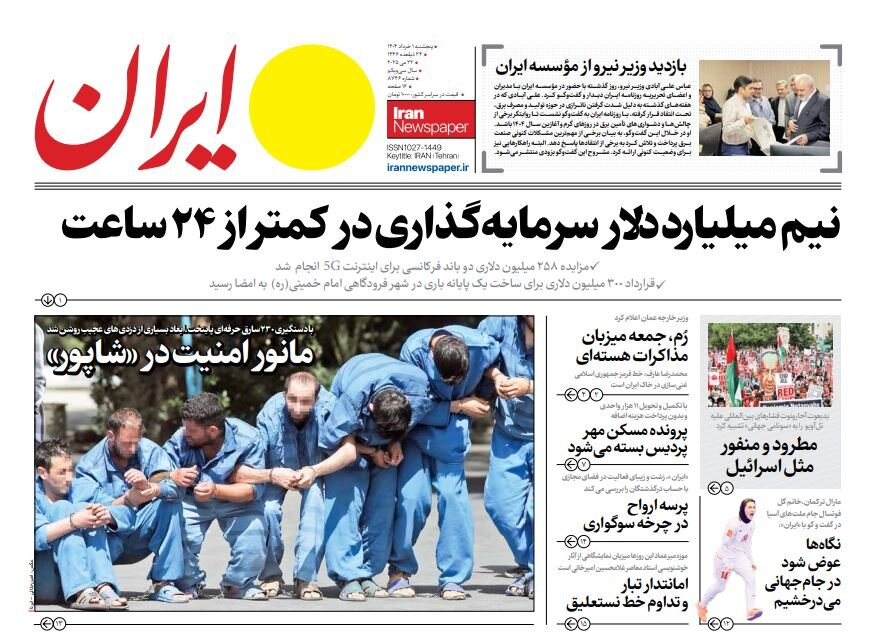Tehran – In commentary, the Iranian newspaper discussed the continued negotiations between Iran and the US, saying: Rome once again hosted a fifth round indirect consultation between Iran and the US via Oman.
The meeting took place a few days ago, but an oral dispute broke out between officials from both countries. The conflict that Washington is a contradictory, sometimes provocative position on Iran’s right to enrich uranium. Diplomatic sources say that even concrete and innovative ideas for the past four negotiations have been proposed. But now, instead of moving towards agreement, the pass appears to be heading towards stagnation. Furthermore, according to Araguchi, the importance of the neighbour’s status in the Islamic Republic’s foreign policy approach is very high, and our neighbours are our priorities in terms of politics, economic and cultural. Tehran maintains its policy of involvement with its neighbors as the main pillar of its diplomatic doctrine. This approach can play an important role in redefineing the balance, especially in environments where local tensions are tied to multiple actors in multiple locations.
Siasat-e-Rooz: Denying nuclear technology is a violation of people’s rights
In his memo, Siasat-e-Rooz addresses the inhuman nature of the international system, writing: The fate of negotiations between Iran and the United States over the removal of nuclear issues and sanctions has degenerated into a state of great uncertainty. Contrary to the US claims, the impact of sanctions on the people of Iran is far-reaching in violation of human rights and all international laws and regulations, according to a report by Special Rapporteur Alena Duhan on the negative impacts of unilateral enforcement measures in 2022. It is inhumane to call on Iran to completely eliminate nuclear enrichment programs, especially as nuclear technology is essential for treatment, food supplies and other fundamentals. Therefore, the US call is a violation of this right. The actions of self-proclaimed human rights advocates, including Western countries, reflect the inhuman nature of the international system. Such an approach does not even comply with its own human rights laws or claims, preferring its benefits over the lives of millions of people.
Jam-e-Jam: Local connections are progressing well
In an interview with Dr. Ali Bagheri, secretary of the Council on Foreign Relations Strategy, Jammu discussed Iran’s relationship with his neighbors. He said: The relations between Iran and its neighbors under the 13th government have entered into a new chapter. Neighborhood policies do not actually allow gaps to remain between Iran and these countries in the region so that the enemy can create distance between their neighbors at the regional level. During this period, we are facing very new conditions and this situation is very promising. This consistency and synergy between the countries in this region is on track. The acceptance of Iran’s regional role in regional countries should be viewed as a sign of the effectiveness of neighbourhood policies. However, our neighbors have different relationships with non-regional countries, and some simply pursue their goals at the regional level. The approach to strengthening the Republic of Iran’s neighbourhood policy concluded that other countries must look at new regional relations. In addition, strengthening local ties will become a platform for securing and ensuring national interests.
Ettelaat: Don’t expect economic solutions with this policy!
Etterato spoke with economist Camran Nadri about the extent to which Palermo ratification will have on the foreign exchange market. He said: Palermo’s conditional ratification will not have much impact on the foreign exchange market for now. The economic environment, particularly the foreign exchange market, is 100% accepting the impact of foreign policy doctrine. Therefore, unless we fully embrace FATF and have foreign investments and economic interactions with the world, we cannot expect economic solutions. As long as the fate of sanctions is not determined and these limited trade exchanges are carried out by avoiding sanctions, we cannot expect a breakthrough. If macro decisions and policies are made without considering economic circumstances or constraints, the central bank or planning and budgetary organization cannot control the market based on economic accounts. The country’s economy is often a victim of political manipulation, and economic improvement cannot be expected unless economic development is at its highest level of governance and its economy is a top priority.

